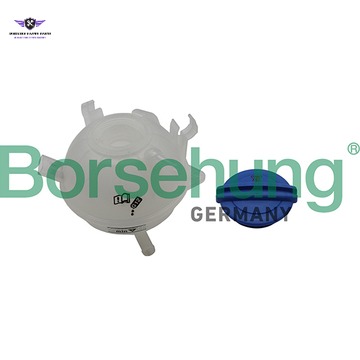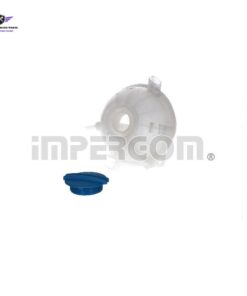Borsehung Coolant bottle Jetta (1.4TSI)
$400
The coolant expansion tank serves as a reservoir to allow coolant to expand and contract as the coolant temperature and pressure in the system change. A broken expansion tank will not hold fluid or allow the system to pressurize properly.
Engine Coolant Reservoir
The engine coolant reservoir, also known as an ‘overflow bottle’ is a crucial component of modern vehicle cooling systems. Its job is to capture the increased volume of engine coolant that is created as the coolant is heated and expands. It needs someplace to go, so a coolant line that typically runs from the radiator outlet to the top of the engine coolant reservoir will feed the reservoir, while the reservoir feeds the engine as it needs more coolant to send through the engine and back through the radiator.
Engine coolant reservoirs are typically made of plastic and can be either clear or opaque. Some performance or aftermarket overflow bottles are made of aluminum or other more durable materials.
Engine Coolant Reservoir Failure Symptoms
Fogging: Over time, due to chemical exposure, age, and heat cycles, the clear plastic used in most engine coolant reservoirs can become foggy and opaque. This can make it difficult to read the coolant level accurately.
Leaks/ Cracking: The most common area for an engine coolant reservoir to leak is usually at a plastic seam or seal. As the bottle is run through thousands of heat cycles, from ambient temperatures below freezing to 200 degrees Fahrenheit plus, the weakest part of the reservoir, usually a seam or molded junction, can crack and fail.
Age: Over time, due to age and exposure, the plastic and materials will become brittle and prone to cracking and other age-related failures.
Coolant leaks: The most common failure of a bad engine coolant reservoir is a coolant leak. This can be slow or minimal, or it can be a total instant failure of the reservoir. If you notice a slow coolant leak and can diagnose it back to the overflow bottle, or coolant reservoir, it is recommended to replace it asap.
Overheating: A bad engine coolant reservoir can reduce engine cooling system pressure, reducing the effective boiling point of the engine coolant. Depending on temperatures and conditions, this can result in engine overheating.
3 in stock



Reviews
There are no reviews yet.